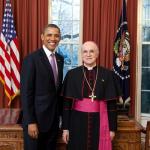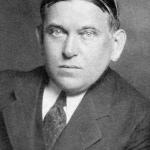Joe Carter thinks that after 500 years, Protestants are finally understanding vocation:
While vocation is broader than just our occupation, our jobs are often a primary way we serve our neighbors. As TGC’s Theological Vision for Ministry states, “Christians glorify God not only through the ministry of the Word, but also through their vocations of agriculture, art, business, government, scholarship—all for God’s glory and the furtherance of the public good. Too many Christians have learned to seal off their faith–beliefs from the way they work in their vocation.” . . .
My grandfather spent most of his adult life working as a school janitor. I suspect that during his lifetime he never heard another Christian tell him his job could be considered his calling. Even more dispiriting, he’d face the same situation today, as nearly three-fourths of Christians today would be hesitant to say that God called him to such work.
“Even janitors and accountants serve the common good,” says Cory Maxwell-Coghlan, a senior writer at Barna Group. “When we conflate God’s kingdom with the institutional church (i.e., only clergy or missionaries are engaging in full-time sacred work) we restrict the scope of God’s work and kingship.”
What does it say about the church when we dismiss the work of men and women who provide a safe and clean learning environment for our own children as unimportant? What does it say about us when we act as if we don’t believe God could call anyone to such worthy labor? What do such dismissive attitudes reveal about our beliefs, not only of calling and vocation but about God himself?
The problem here is two-fold. First, Carter leaves out the non-Christian janitors who provide safe and clean learning environments. The Protestant doctrine of vocation is not simply about the work that Christians do. It is also tied to the image of God in all people and the task that God gave to Adam and Eve when he told them to multiply and subdue the earth. Divine providence, the way God superintends his creation, relies upon a host of secondary causes. The sun dries out flooded land. Aspirin relieves pain. Farmers grow food that sustains farmers and workers. The work that human beings do, then, is part of God’s care for all of his creation. A farmer doesn’t have to be a Christian for his food to feed hungry mouths. To be sure, a Christian farmer may seek to glorify God by devoting his activities to serving God and loving neighbor. But countless activities that men and women perform, Christian or not, is a service to others and a testimony to the original calling God gave to human beings to care for the earth.
Heck, even critters glorify God and they don’t have souls:
What kind of a worldview does a wren exhibit when it sees the neighbor’s cat crouching in preparation to pounce and flies to the nearest telephone line? Is the bird’s knowledge of the feline species somehow diminished because he can’t theorize about his knowledge of cats and their objects of backyard prey?
What about a baseball player who can spot the difference between a curve and a four-seam fastball, all within a nanosecond, and swing his bat while uncoiling his body to launch the baseball into the right field stands? If the batter can’t explain his theory of hitting, if the Phillies won’t hire him when he retires to be a hitting coach, does that make his knowledge of crushing mistake pitches illegitimate? Does every batter have to be a Ted Williams for his hits to be certain and his runs-batted-in certified? Did Richie Allen not win the American League MVP for 1972 because he could not theorize about what he did in the batter’s box?
Cats are going to hunt birds. It’s what they do. Americans are going to play baseball and calculate batting averages. It is what they do as human beings. That non-salvific activity, that non-sanctified work, is still part of glorifying God because it reflects the creator and because it is part of what it means to be a cat or a human.
The second problem with Carter’s notion of vocation is that it seems to allow him to pat The Gospel Coalition on the back for helping Christians see how they can glorify God transforming culture, from the high of political power to the low of cleaning urinals. Again, this gives Christians a privileged position, as if non-Christian politicians are somehow unwholesome or illegitimate. Instead of using vocation to underwrite efforts to turn everything into a “gospelly” endeavor, the better and Reformational way is to think of vocations as callings that God gives to all people (not to mention to all parts of creation. Working for the common good is not restricted to Christians. In fact, when Christians begin to think they are working for the common good they invariably overreach and conflate the common good with the good of Christians (who want to make society look like the church or the Christian home).
The solution is to secularize the doctrine of vocation by locating it in the realms of creation and providence, spheres that apply to all people, and to cats, planets, and water. The good works of sanctification are in a different realm, the one of redemption. Keeping creation (and providence) and redemption straight, allows keeping straight church and state, theology and science, pastors and police, believers and unbelievers.












